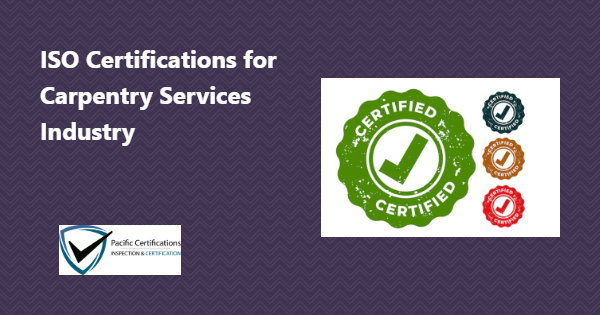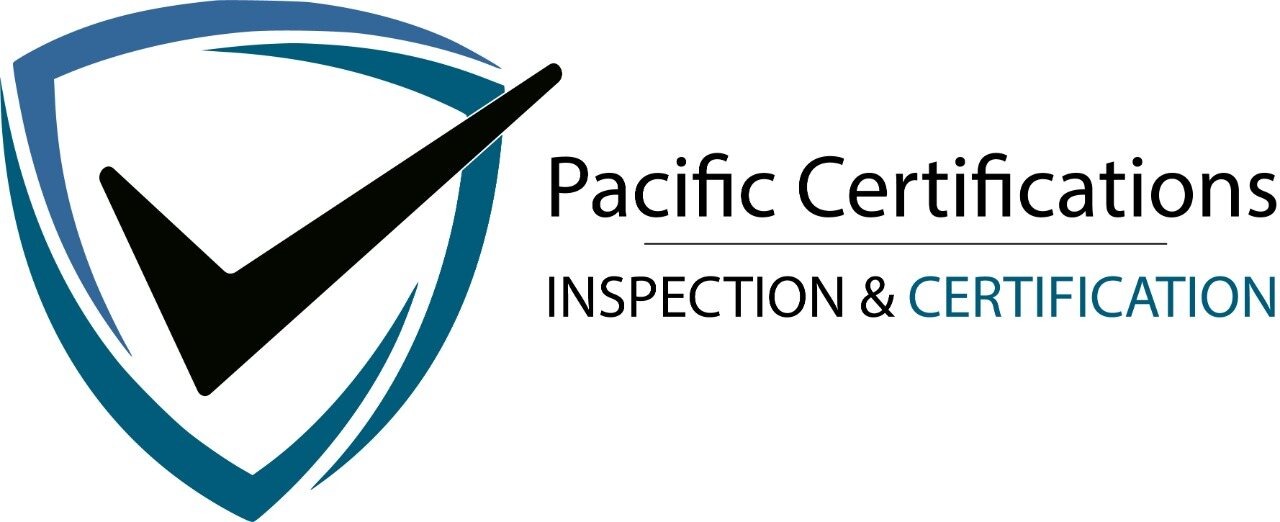ISO Certifications for Carpentry Services, Requirements and Benefits

Obtaining ISO certifications for the Carpentry Services Industry can be a valuable endeavor for businesses in this sector, as it demonstrates a commitment to quality, safety, and environmental responsibility.
Applicable ISO standards for Carpentry Services Industry
Many ISO standards are applicable to the Carpentry Services Industry. These standards can help carpentry businesses ensure the quality, safety, and environmental responsibility of their services. Here are some ISO standards relevant to the Carpentry Services Industry:
- ISO 9001:2015 (Quality Management System): ISO 9001 sets the foundation for quality management. Carpentry businesses can use this standard to establish processes that ensure consistent quality in materials, workmanship, and customer satisfaction. It helps in minimizing errors and customer complaints, improving overall service quality.
- ISO 14001:2015 (Environmental Management System): ISO 14001 focuses on environmental responsibility. In carpentry, this standard can be applied to reduce the environmental impact of operations. This includes minimizing waste, reducing energy consumption, and sourcing sustainable materials, which is crucial in woodworking.
- ISO 45001:2018 (Occupational Health and Safety Management System): Safety is paramount in the Carpentry Services Industry. ISO 45001 helps in establishing a framework for identifying and controlling health and safety risks. It ensures the safety and well-being of workers by promoting safe work practices and reducing workplace accidents.
- ISO 27001:2022 (Information Security Management System): While not specific to carpentry, ISO 27001 is important for safeguarding sensitive information. Carpentry businesses may handle customer data, financial records, or project plans, and ISO 27001 can help protect this information from breaches or theft.
- ISO 9001:2001 (Timber and Timber Products): This standard is specifically designed for the timber and timber products industry. It covers aspects related to the processing, grading, and quality control of timber, which can be highly relevant to carpentry businesses that work with wood.
- CE Marking: If your carpentry products are intended for sale in the European Union, CE marking is essential. It signifies compliance with EU health, safety, and environmental protection regulations, which are important for carpentry-related products.
- HACCP (Hazard Analysis and Critical Control Points): If your carpentry services include manufacturing or handling wooden products that may have food contact, HACCP certification is crucial. It ensures the safety of products used in food-related applications.
- ISO 50001 (Energy Management System): Carpentry businesses can benefit from ISO 50001 by optimizing energy usage. This standard helps in identifying energy-saving opportunities and reducing energy costs, which is relevant for woodworking operations.
- ISO 20400 (Sustainable Procurement): If your carpentry business procures materials and products, ISO 20400 can guide sustainable procurement practices, ensuring that materials are sourced responsibly and ethically.
- ISO 19650 (Building Information Modeling - BIM): For carpentry businesses involved in construction projects, ISO 19650 sets guidelines for managing digital information throughout the building lifecycle. It can improve collaboration and information management in construction projects.
Click here to find more applicable standards to your industry
These ISO standards can be tailored to the specific needs and operations of carpentry businesses, helping them achieve excellence in quality, safety, environmental responsibility, and overall efficiency. Certification in these standards can also enhance a carpentry company's reputation and competitiveness in the market.
Benefits of ISO Certifications for Carpentry Services
- Enhanced Credibility: ISO certifications enhance your company's reputation and credibility, reassuring clients that your services meet international standards.
- Improved Efficiency: Implementing ISO standards often leads to more efficient processes, reducing waste and costs. For example, optimizing material usage in carpentry can lead to cost savings.
- Market Access: ISO certifications can open doors to new markets, especially when dealing with international clients who prioritize quality and safety.
- Legal Compliance: Meeting ISO standards can help ensure your carpentry business complies with relevant laws and regulations.
- Employee Morale: ISO 45001 can boost employee morale by demonstrating a commitment to their health and safety.
In conclusion, obtaining ISO certifications for the Carpentry Services Industry can provide tangible benefits in terms of quality, safety, environmental responsibility, and market access. These certifications can be a valuable investment for your business, showcasing your dedication to excellence in carpentry services.
Requirements of ISO Certifications for Carpentry Services Industry
Obtaining ISO certifications for the Carpentry Services Industry requires a structured approach to meet specific requirements outlined in each ISO standard. Here are the key requirements for some of the relevant ISO certifications:
ISO 9001:2015 (Quality Management System)
- Establish a quality management system (QMS) that meets the requirements of ISO 9001.
- Define and document processes, responsibilities, and procedures within the QMS.
- Ensure customer focus and satisfaction by meeting customer requirements and addressing feedback.
- Continuously monitor and improve processes through performance metrics and audits.
ISO 14001:2015 (Environmental Management System)
- Develop an environmental policy and objectives aligned with the organization's environmental aspects and legal obligations.
- Identify and assess environmental aspects and impacts associated with carpentry operations.
- Implement controls to minimize negative environmental impacts.
- Prepare for emergency situations related to environmental issues.
ISO 45001:2018 (Occupational Health and Safety Management System)
- Establish an occupational health and safety (OH&S) policy, including a commitment to provide a safe workplace.
- Identify and assess occupational health and safety risks and hazards.
- Develop and implement control measures to mitigate risks.
- Ensure compliance with legal requirements related to health and safety.
ISO 27001:2013 (Information Security Management System)
- Develop an information security policy that outlines the organization's commitment to data protection.
- Conduct a risk assessment to identify information security risks and vulnerabilities.
- Implement security controls to address identified risks.
- Continuously monitor and manage information security incidents.
CE Marking
- Comply with the relevant EU directives and regulations applicable to your carpentry products.
- Perform conformity assessments, including testing and documentation, to demonstrate product compliance.
- Affix the CE mark to your products as a declaration of conformity.
HACCP (Hazard Analysis and Critical Control Points)
- Conduct a hazard analysis to identify potential food safety hazards in carpentry processes.
- Establish critical control points (CCPs) and associated control measures to prevent or mitigate hazards.
- Implement monitoring, record-keeping, and corrective action procedures.
ISO 50001 (Energy Management System)
- Develop an energy policy that aligns with the organization's energy objectives.
- Conduct an energy review to identify energy sources, consumption patterns, and areas for improvement.
- Set energy performance indicators (EnPIs) and targets.
- Implement energy-saving measures and regularly assess performance.
ISO 20400 (Sustainable Procurement)
- Establish a sustainable procurement policy and objectives.
- Identify and assess suppliers based on sustainability criteria.
- Implement sustainable procurement practices, including supplier engagement and monitoring.
- Continuously improve sustainability performance in procurement.
ISO 19650 (Building Information Modeling - BIM)
- Adopt BIM processes and technologies for construction projects, if applicable.
- Develop a BIM execution plan (BEP) that outlines project-specific BIM requirements.
- Collaborate effectively with project stakeholders and manage digital information throughout the project lifecycle.
It's important to note that each ISO certification has its specific documentation and process requirements. Certification bodies accredited by organizations like ABIS can assist in the certification process, including conducting audits to assess compliance with these requirements.
To successfully obtain ISO certifications, carpentry businesses should develop and implement comprehensive management systems, document processes and procedures, conduct regular internal audits, and continually improve their operations in line with the specific ISO standard's requirements.
Benefits of ISO Certifications for Carpentry Services Industry
Obtaining ISO certifications can provide numerous benefits for businesses in the Carpentry Services Industry. These certifications demonstrate a commitment to quality, safety, environmental responsibility, and overall excellence. Here are the key benefits of ISO certifications for the Carpentry Services Industry:
- Enhanced Credibility and Reputation:
- ISO certifications are globally recognized and respected, enhancing the reputation of a carpentry business. They signal a commitment to high standards and quality.
- Improved Quality of Services:
- ISO 9001 certification ensures a focus on quality management. Carpentry businesses can provide consistently high-quality services by adhering to ISO 9001 requirements, resulting in customer satisfaction and loyalty.
- Efficient Operations:
- Implementing ISO standards often leads to more efficient processes, reducing waste and costs. For example, optimizing material usage and reducing errors can result in cost savings.
- Reduced Errors and Defects:
- ISO 9001 and other relevant standards help in identifying and addressing errors early in the process, reducing defects and rework. This leads to cost savings and improved client satisfaction.
- Enhanced Safety:
- ISO 45001 certification focuses on occupational health and safety. By implementing safety protocols and risk assessments, carpentry businesses can reduce workplace accidents and injuries, leading to a safer working environment.
- Environmental Responsibility:
- ISO 14001 certification highlights a commitment to environmental responsibility. Carpentry businesses can minimize waste, reduce energy consumption, and use sustainable materials, which is increasingly important to eco-conscious customers.
- Market Access:
- ISO certifications can open doors to new markets, especially when dealing with international clients who prioritize quality and safety. It can provide a competitive edge in the market.
- Legal Compliance:
- ISO certifications often align with legal and regulatory requirements. This ensures that the carpentry business remains in compliance with relevant laws and regulations.
- Customer Satisfaction:
- Meeting ISO standards means consistently meeting customer requirements and expectations. Satisfied customers are more likely to provide positive reviews and referrals.
- Employee Morale:
- ISO 45001 certification can boost employee morale by demonstrating a commitment to their health and safety. Happy and safe employees are more productive and loyal.
- Risk Management:
- ISO standards require risk assessments and the development of control measures. This proactive approach to risk management can help carpentry businesses avoid costly incidents.
- Continuous Improvement:
- ISO certifications promote a culture of continuous improvement. Carpentry companies can continually assess and refine their processes for better results.
- Supplier and Partner Relationships:
- ISO certifications can enhance relationships with suppliers and partners who value quality, safety, and environmental responsibility.
- Cost Savings:
- Through improved efficiency, reduced errors, and minimized waste, ISO certifications can lead to significant cost savings over time.
- Marketing and Competitive Advantage:
- ISO certifications can be a powerful marketing tool, allowing carpentry businesses to differentiate themselves in a competitive market and attract new clients.
In conclusion, ISO certifications for the Carpentry Services Industry offer a wide range of benefits, including improved quality, safety, efficiency, and market access. They not only enhance a company's reputation but also contribute to long-term success and sustainability.
If you need more support with ISO certification for your business in the Carpentry Industry, please contact us at +91-8595603096 or [email protected].

Read more: ISO Certifications for Aerospace industry Requirements and Benefits
